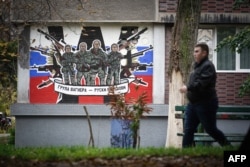On January 21, White House National Security spokesperson John Kirby announced that the Wagner Group, a Russian private military company also known as Wagner PMC, would be designated a transnational criminal organization.
The designation will freeze any assets Wagner has in the United States and prevent Americans from supplying, funding or servicing the group.
Kirby said the Wagner Group, which has played an active role in Russia’s war against Ukraine and beyond, “is a criminal organization that is committing widespread atrocities and human rights abuses,” adding that it is “becoming a rival power center to the Russian military and other Russian ministries.”
Wagner Group founder Yevgeny Prigozhin lashed out at the impending designation in a bombastic op-ed published by Russian state broadcaster RT.
Large parts of Prigozhin’s op-ed attempt to distract by engaging in historical whataboutism and conspiracy theorizing. But Prigozhin also denies that the group has committed human rights abuses:
“The Wagner PMC has not committed any crimes. Others spend their days trying to pin various crimes on us in different parts of the world. But, unlike America’s paramilitary forces, the Wagner PMC eliminates only enemies of peace and commits no crimes.”
That is likely false based on a growing body of evidence associating Wagner with brutalities in Africa, Ukraine and the Mideast.
Prigozhin, popularly known as “Putin’s chef” for his restaurants that frequently served President Vladimir Putin and catering business that secured Russian government catering contracts, for a long time had denied any connection to the paramilitary group, which was created to support Russia’s clandestine invasion of Ukraine in 2014.
But last September, after Russia launched a full-scale invasion of Ukraine, Prigozhin admitted he had founded Wagner (despite having sued journalists for reporting so earlier.)
Prior to deploying its forces to Ukraine, Wagner sent mercenaries to the Central African Republic, Libya, Mali, Mozambique, Syria and Sudan.
In Libya, Wagner Group mercenaries have fought alongside the Benghazi-based Libya National Army (LNA), led by Khalifa Haftar. An August 2021 BBC report on Wagner’s activities in Libya said “[t]here is little doubt that they kill prisoners,” citing an ex-fighter who said "[n]o-one wants an extra mouth to feed.”
That report linked to a 2021 documentary produced by BBC News Arabic and BBC News Russian, which included “accounts of other suspected war crimes,” including the intentional killing of civilians and killing of prisoners.
The government of Mali has used Wagner forces to battle jihadists. Although Islamist extremists have been implicated in civilian deaths, monitors have tied the deployment of Wagner mercenaries to the West African country with an “exponential rise in the number of civilian victims."
Human Rights Watch (HRW) linked Wagner (along with Malian armed forces) to the summary execution of an estimated 300 civilian men in March 2022.
The U.S. State Department called for those killings to be investigated, but Russia used its U.N. Security Council veto to block an effort by France to do just that.
In the Central African Republic (CAR), Wagner forces have helped prop up the government of Faustin-Archange Touadera while guarding gold and diamond minds and battling armed groups.
HRW said there is “compelling evidence that Russian-identified forces supporting the Central African Republic’s government have committed grave abuses against civilians with complete impunity.”
That includes allegations that “Russian-speaking forces” killed 12 unarmed men near the town of Bossangoa in July 2021.
In March 2021, U.N. experts said reports had implicated Wagner forces in “systemic and grave human rights and international humanitarian law violations, including arbitrary detention, torture, disappearances and summary execution, a pattern that continues unabated and unpunished.”
The U.N. experts also received reports that “Wagner Group officers have committed rape and sexual violence against women, men, and young girls.”
In August 2022, a United Kingdom Foreign Affairs Committee inquiry found that “civilian targeting accounts for 52% and 71% of Wagner involvement in political violence in CAR and Mali, respectively.”
That far exceeds the rate of civilian targeting committed by allied state forces, major insurgent groups and other combatants, the report said.
There is also evidence Wagner mercenaries have committed war crimes in Syria, where the paramilitaries are fighting alongside President Bashar al-Assad’s forces.
That includes a video from 2019 showing Russian-speaking men beating, torturing and beheading an unarmed man who deserted from the Syrian army. The Russian newspaper Novaya Gazeta produced evidence “leaving little doubt left” that one of the alleged participants in the killing was a Wagner Group member.
Russia stonewalled efforts to seek accountability for that incident through the Russian legal system.
In Sudan, the Wagner Group is allegedly plundering gold and diamonds used, in part, to fund Russia’s war effort in Ukraine, in exchange for protecting Sudan’s unpopular military leader.
Wagner has been implicated in attacks on civilians in a Sudanese gold-mining area that left hundreds dead and thousands displaced.
Then there is Ukraine, where Wagner is believed to have deployed some 50,000 fighters (80% of whom are believed to have been recruited from Russian prisons).
Germany’s foreign intelligence service intercepted radio traffic in which Russian forces discussed the killing of civilians in “the region north of Kyiv,” Germany’s Der Spiegel reported.
The intercept coincided with killings in Bucha, where dozens of civilians (and likely more) were massacred in March 2022. German intelligence provided evidence that the “Wagner Group played a leading role in the atrocities” in Bucha.
Earlier this month, a former Wagner commander claimed asylum in Norway, and said he was willing to aid investigations into alleged war crimes committed by the group. He claims to have witnessed “summary executions of Wagner fighters accused of cowardice and desertion.”
CNN reported on phone intercepts obtained by a Ukrainian intelligence source depicting the ruthless attitude that Wagner allegedly has toward its own forces, including the alleged castration of a fighter who tried to surrender.
Perhaps most infamously, Wagner has been accused of brutally murdering one of its returned prisoners of war with a sledgehammer.
People close to the Wagner Group told BBC Russian on condition of anonymity that the sledgehammer killing was similar to three other reprisal killings, although the BBC could not confirm those details.
Prigozhin sent a sledgehammer, engraved with the Wagner logo and smeared with fake blood, to the European Parliament after legislators demanded that Wagner be placed on the European Union’s terror list.






